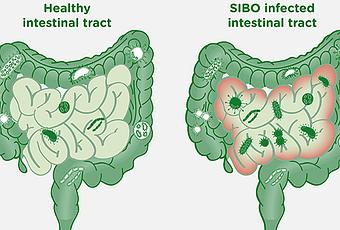
Because the small intestine plays host to immune cells, bacterial imbalance can also lead to poor immune system function. SIBO is often a factor in IBS, and over time, can lead to chronic fatigue and a host of other health issues. Intolerance to histamine, causing hives, runny nose and sneezing.Abdominal pain, cramping and indigestion.
#Small intestine bacterial overgrowth cure full#

In contrast, your small intestine naturally plays host to only a relatively small number of bacteria, and they’re significantly different types to those found in your large intestine. You may be aware of the enormous population of bacteria making your large intestine their home and living in symbiosis with you. It makes sense that the two very different environments in the small and large intestines should play host to different microbes. In your large intestine on the other hand water is removed, waste products are processed for excretion and bacteria ferment dietary fibre to liberate more vitamins.

It’s where most of the nutrients from your food are absorbed. Your small intestine is around three and a half times the length of your body, and it’s joined to your much shorter colon by a special valve.

These aren’t usually disease-causing bacteria, they’re simply bacteria in the wrong place. Small Intestinal Bacterial Overgrowth, SIBO for short, develops when bacteria normally living in your large intestine migrate into your small intestine.


 0 kommentar(er)
0 kommentar(er)
